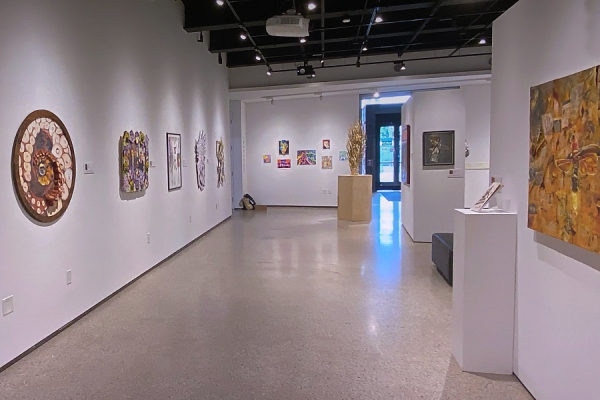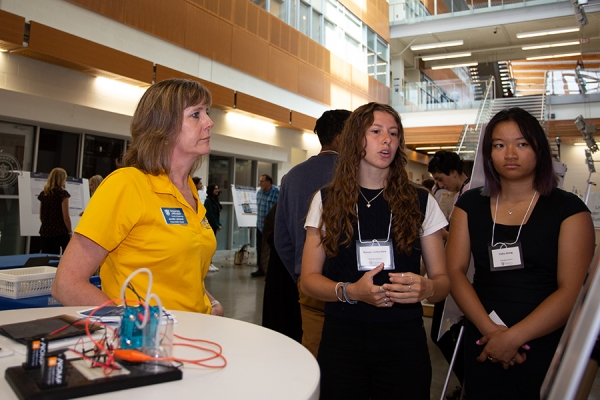 University officials and members of the Rodzik family celebrate the opening of the re-imagined Moot Court.
University officials and members of the Rodzik family celebrate the opening of the re-imagined Moot Court.
Windsor Law opened its doors last week to a multi-million-dollar renovation within the brick shell of the Ron W. Ianni Faculty of Law Building on the corner of Sunset and University avenues.
Many of the spaces are unrecognizable with new, bright, and open student lounges, modern furniture, learning spaces, collaboration zones, and the state-of-the-art Don Rodzik Moot Court where students can replicate court proceedings. The entire building was retrofitted to establish an open concept design connecting all three floors and allowing natural light to filter through skylights from top to bottom.
“This newly redesigned building represents Windsor Law’s commitment to creating a legal education that represents its student body,” said Reem Bahdi, dean of law. “By creating a welcoming and accessible environment, it will promote dynamic learning and student wellness.”
The addition of expansive windows reduces energy costs and grants views of the busiest border crossing in the world — a reminder of the faculty’s transnational commitments. The physical space also highlights the school’s obligation to Indigenous peoples with themes woven throughout the building’s architecture, including areas for smudging.
A ventilation system that formerly dominated the heart of the building has now been moved to the roof, and has been replaced with a large, usable area featuring a collaborative space and high-tech meeting rooms.
“Transforming the University of Windsor’s law building is much more than a renovation of a 50-year-old brutalist-style building,” said Duncan Higgins, principal at Diamond Schmitt Architects. “The approach was to embrace the architectural character of the facility and its history on campus, while creating an open and collaborative space that offers flexibility for diverse modes of learning and supports the pedagogies of the 21st century.”
New elevators, ramps, automatic doors, tactile surfaces, accessible entrances, and universal washrooms are integral to the design and uphold the University’s strategic priorities of creating a welcoming campus. Classrooms are fitted with moveable furniture for a variety of teaching and learning needs and are equipped with advanced communications and presentation technology to reach a broader group of experts, mentors, and audiences beyond campus.
Besides the architects, contributing partners included EllisDon Corporation, the Fortis Construction Group, and donors from the Windsor Law community who raised almost $6 million, including a gift of $3 million from the Don Rodzik Foundation.
“It was critical for us to work closely with the architects to ensure the mission, vision, and values of the faculty were reflected in every new design feature and element of the retrofit. Accessibility, wellness, and inclusiveness are embedded in our practice, and it was important for it to be a physical part of the building,” Bahdi said.
“Thanks to the support of our dedicated friends and alumni, we have reinvented the Windsor Law building to reflect the needs of the next generation of diverse law students and scholars who can now teach, learn, and serve their communities in a dynamic new setting.”
UWindsor president Robert Gordon joined members of the Rodzik family for a tour of the facility on Friday.
“Today, we celebrate not just the physical renovation of our law school, but the enduring spirit of generosity and belief in the power of education and importance of nurturing a sense of shared purpose,” Dr. Gordon said. “We are grateful for the support of the Don Rodzik Foundation for helping us create a lasting legacy through knowledge creation and by fostering an ethos of giving back and a commitment to creative positive change in the world.”
To commemorate this transformation, Windsor Law will hold a grand reopening celebration on Oct. 27 and 28. Learn more about Transforming Windsor Law at uwindsor.ca/law/twl.
—Dalia Mazhar





